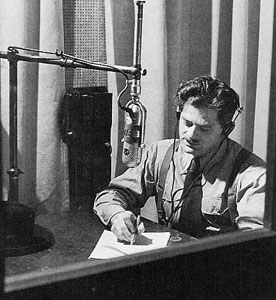Dean Martin and Judy Holliday sing “Just in Time,” from the film version of Bells Are Ringing:
Archives for 2011
TT: Almanac
“Writing is the thing that props me up.”
Horton Foote (quoted in the New York Times Magazine, Aug. 19, 2007)
TT: Didja hear the one about the hunchback?
In today’s Wall Street Journal I report on two shows, the Old Vic’s Richard III in San Francisco and the Broadway premiere of Relatively Speaking. Both are disappointments. Here’s an excerpt.
* * *
 The smartest thing that Kevin Spacey ever did was scale back his film career in order to become the artistic director of London’s Old Vic. Though he’s a gifted actor, his range is narrow, and his brief run as a Hollywood leading man was something of a fluke. Not only is the stage his natural habitat, but “Richard III” appears at first glance to be well suited to his knack for playing unhappy men who despise themselves. Sam Mendes, who directed Mr. Spacey in “American Beauty,” is at the helm of this production, the latest installment in the Old Vic’s Bridge Project, which will come to New York’s BAM Harvey Theatre in January. Would that it were worth waiting for, but it doesn’t come off, and it looks like both men are equally to blame.
The smartest thing that Kevin Spacey ever did was scale back his film career in order to become the artistic director of London’s Old Vic. Though he’s a gifted actor, his range is narrow, and his brief run as a Hollywood leading man was something of a fluke. Not only is the stage his natural habitat, but “Richard III” appears at first glance to be well suited to his knack for playing unhappy men who despise themselves. Sam Mendes, who directed Mr. Spacey in “American Beauty,” is at the helm of this production, the latest installment in the Old Vic’s Bridge Project, which will come to New York’s BAM Harvey Theatre in January. Would that it were worth waiting for, but it doesn’t come off, and it looks like both men are equally to blame.
Mr. Spacey turns Shakespeare’s villainous hunchback-king into a monochromatic monster in a leg brace, by turns sarcastic, petulant and supercilious. He shoots for and gets plenty of laughs, an approach that can work–it worked for John Douglas Thompson in Shakespeare & Company’s 2010 production–but Mr. Spacey, unlike Mr. Thompson, is not a classical actor, and his voice lacks the color and amplitude necessary to bring Shakespeare’s verse to life. Too often he resorts to ranting, and the fact that he is surrounded by a first-class supporting cast draws further attention to his limitations….
Mr. Mendes has his own limitations. I haven’t much cared for the unpoetic, self-consciously clever Shakespeare productions that he’s previously mounted as part of the Bridge Project, and this modern-dress “Richard III” is in many ways all of a piece with the “Tempest” and “Winter’s Tale” that preceded it. No sooner do you walk into the theater than you see the word NOW projected in huge letters on the back wall of the set. That’s just what Mr. Mendes gives us, a fast shuffle through the stock Shakespeare-our-contemporary clichés…
It isn’t hard to see why the producers of “Relatively Speaking” thought it would be a smart idea to bring to Broadway a triple bill of one-act comedies by Woody Allen, Ethan Coen and Elaine May. Big names fill seats, and if your target market is retirement-age New Yorkers, Mr. Allen and Ms. May are more than big enough to do the job all by themselves, with Mr. Coen as a special added attraction for somewhat younger nihilists. The theory is impeccable, the results disastrous….
* * *
Read the whole thing here.
TT: Almanac
“Certain things, once said, can change at a stroke the interior workings of love, leaving the outside architecture untouched.”
William Brodrick, The Sixth Lamentation
TT: So you want to see a show?
Here’s my list of recommended Broadway, off-Broadway, and out-of-town shows, updated weekly. In all cases, I gave these shows favorable reviews (if sometimes qualifiedly so) in The Wall Street Journal when they opened. For more information, click on the title.
BROADWAY:
• Anything Goes (musical, G/PG-13, mildly adult subject matter that will be unintelligible to children, closes Apr. 29, most performances sold out last week, reviewed here)
• Follies (musical, PG-13, adult subject matter, closes Jan. 22, reviewed here)
• How to Succeed in Business Without Really Trying (musical, G/PG-13, perfectly fine for children whose parents aren’t actively prudish, most performances sold out last week, reviewed here)
• Man and Boy (drama, PG-13, closes Nov. 27, most performances sold out last week, reviewed here)
OFF BROADWAY:
• The Agony and the Ecstasy of Steve Jobs (monologue, PG-13, closes Nov. 13, reviewed here)
• Avenue Q (musical, R, adult subject matter and one show-stopping scene of puppet-on-puppet sex, reviewed here)
• The Fantasticks (musical, G, suitable for children capable of enjoying a love story, reviewed here)
• Million Dollar Quartet (jukebox musical, G, off-Broadway remounting of Broadway production, original run reviewed here)
IN GLENCOE, ILLINOIS:
• The Real Thing (serious comedy, PG-13, closes Nov. 20, reviewed here)
CLOSING SOON OFF BROADWAY:
• We Live Here (drama, PG-13, closes Nov. 6, reviewed here)
CLOSING SOON IN ASHLAND, OREGON:
• August: Osage County (drama, PG-13/R, closes Nov. 5, reviewed here)
• Julius Caesar (Shakespeare, PG-13, closes Nov. 6, reviewed here)
• Measure for Measure (Shakespeare, PG-13, closes Nov. 6, reviewed here)
CLOSING SATURDAY OFF BROADWAY:
• Lemon Sky (drama, PG-13/R, adult subject matter, reviewed here)
TT: Almanac
“She had seen death at work, its industrious regard for detail, and, like the men who dug up the roads, its preference for doing the job slowly.”
William Brodrick, The Sixth Lamentation
TT: Norman Corwin, R.I.P.
 Norman Corwin, who wrote verse dramas for network radio back in the days when such things were possible, has died at the age of 101. I had the great good fortune to interview him in 1996, and wrote about the experience in a column for Civilization that I subsequently posted on this blog:
Norman Corwin, who wrote verse dramas for network radio back in the days when such things were possible, has died at the age of 101. I had the great good fortune to interview him in 1996, and wrote about the experience in a column for Civilization that I subsequently posted on this blog:
This is how important Norman Corwin was: nine months before World War II ended, CBS commissioned him to write an original radio play to be broadcast on V-E Day. It was called On a Note of Triumph, and it made so powerful an impact that more than a few of its first listeners still remember parts of it word for word. “I’m going to interview Norman Corwin this morning,” I told an older friend of mine, who promptly rattled off its opening lines: Take a bow, G.I.,/Take a bow, little guy./The superman of tomorrow lies at the feet of you common men of this afternoon.
There was room on commercial radio for things like that, just as there was room for Arturo Toscanini and the NBC Symphony, or Orson Welles directing Shakespeare. But it couldn’t last, and it didn’t. One day in 1948, Corwin ran into Bill Paley, the president of CBS, on a train from Pasadena to New York. “We’ve simply got to face up to the fact that we’re a commercial business,” Paley told his star playwright. “If we do not reach as many people as possible, then we’re not making the best use of our talent, our time, and our equipment.” At that moment, Corwin knew his own days at CBS were numbered. To make matters worse, 1948 was also the year network TV finally arrived, and it wasn’t long before radio itself was on the ropes, laid low by Milton Berle. To be sure, Corwin didn’t want for work after he left CBS–among other things, he wrote the script for Lust for Life, Vincente Minnelli’s 1956 film version of the life of Vincent Van Gogh–but the thing he loved best was a thing of the past….
Read the whole thing here.
* * *
The Los Angeles Times obituary is here.
To listen to the 1945 CBS broadcast of On a Note of Triumph, starring Martin Gabel and scored by Bernard Herrmann, go here.
To listen to Corwin’s The Plot to Overthrow Christmas, as rebroadcast by CBS in 1942, go here.
My Wall Street Journal review of the Irish Repertory Theatre’s 2009 off-Broadway revival of The Rivalry, Corwin’s 1959 play about the Lincoln-Douglas debates, is here.
My 2006 “Sightings” column about Lust for Life is here.
Norman Corwin talks about writing On a Note of Triumph:
TT: Snapshot
Luciana Souza records her setting of Pablo Neruda’s “Sonnet 49” in 2003:
(This is the latest in a weekly series of arts-related videos that appear in this space each Wednesday.)
